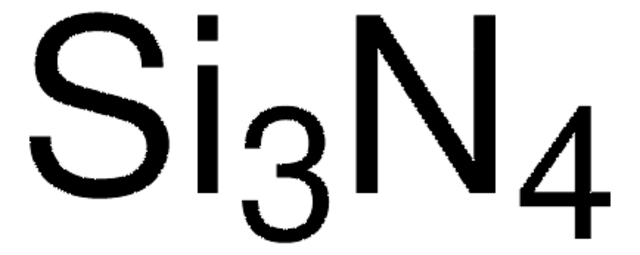325171
Silicon nitride
predominantly α-phase, ≤10 micron
Sign Into View Organizational & Contract Pricing
All Photos(3)
About This Item
Linear Formula:
Si3N4
CAS Number:
Molecular Weight:
140.28
EC Number:
MDL number:
UNSPSC Code:
12352300
PubChem Substance ID:
NACRES:
NA.23
Recommended Products
form
powder
particle size
≤10 micron
density
3.44 g/mL at 25 °C (lit.)
SMILES string
N12[Si]34N5[Si]16N3[Si]25N46
InChI
1S/N4Si3/c1-5-2-6(1)3(5)7(1,2)4(5)6
InChI key
HQVNEWCFYHHQES-UHFFFAOYSA-N
Looking for similar products? Visit Product Comparison Guide
Storage Class Code
11 - Combustible Solids
WGK
nwg
Flash Point(F)
Not applicable
Flash Point(C)
Not applicable
Personal Protective Equipment
dust mask type N95 (US), Eyeshields, Gloves
Choose from one of the most recent versions:
Already Own This Product?
Find documentation for the products that you have recently purchased in the Document Library.
Customers Also Viewed
Jinglin Kong et al.
Journal of nanoscience and nanotechnology, 13(6), 4010-4016 (2013-07-19)
In recent years, nanopore has attracted broad attention as an essential technique for DNA sequencing and nanoparticle sensing. This work presented a fundamental study of nanoparticle translocation through silicon nitride nanopores. Since particles with rather high charge to mass ratio
Madeline J Dukes et al.
Chemical communications (Cambridge, England), 49(29), 3007-3009 (2013-03-06)
Gold nanorods are widely known for their photothermal properties to treat solid tumors. Our work demonstrates the unrealized capacity to image these reagents in liquid at high resolution using Transmission Electron Microscopy (TEM). Here we perform the first atomic measurements
Nazar Ileri et al.
Physical chemistry chemical physics : PCCP, 15(3), 965-971 (2012-12-06)
Millimeter sized arrays of uniformly-distributed nanopores (180-220 nm) were created in thin (200 nm) silicon nitride membranes using interferometric lithography. Molecular transport properties of the fabricated devices were investigated experimentally and compared with those of state-of-the-art polycarbonate track etched membranes.
Francesco Mazzotta et al.
Nanotechnology, 23(41), 415304-415304 (2012-09-29)
One of the primary advantages of nanoscale sensors is that they often can provide conceptually new ways of performing sensing that are not feasible with their large-scale analogs. For example, the small size of nanoscale sensor elements, such as plasmonic
Petru Ghenuche et al.
Physical review letters, 109(14), 143903-143903 (2012-10-23)
We demonstrate that almost 100% of incident photons can interact with a monolayer of scatterers in a symmetrical environment. Nearly perfect optical extinction through free-standing transparent nanorod arrays has been measured. The sharp spectral opacity window, in the form of
Our team of scientists has experience in all areas of research including Life Science, Material Science, Chemical Synthesis, Chromatography, Analytical and many others.
Contact Technical Service








